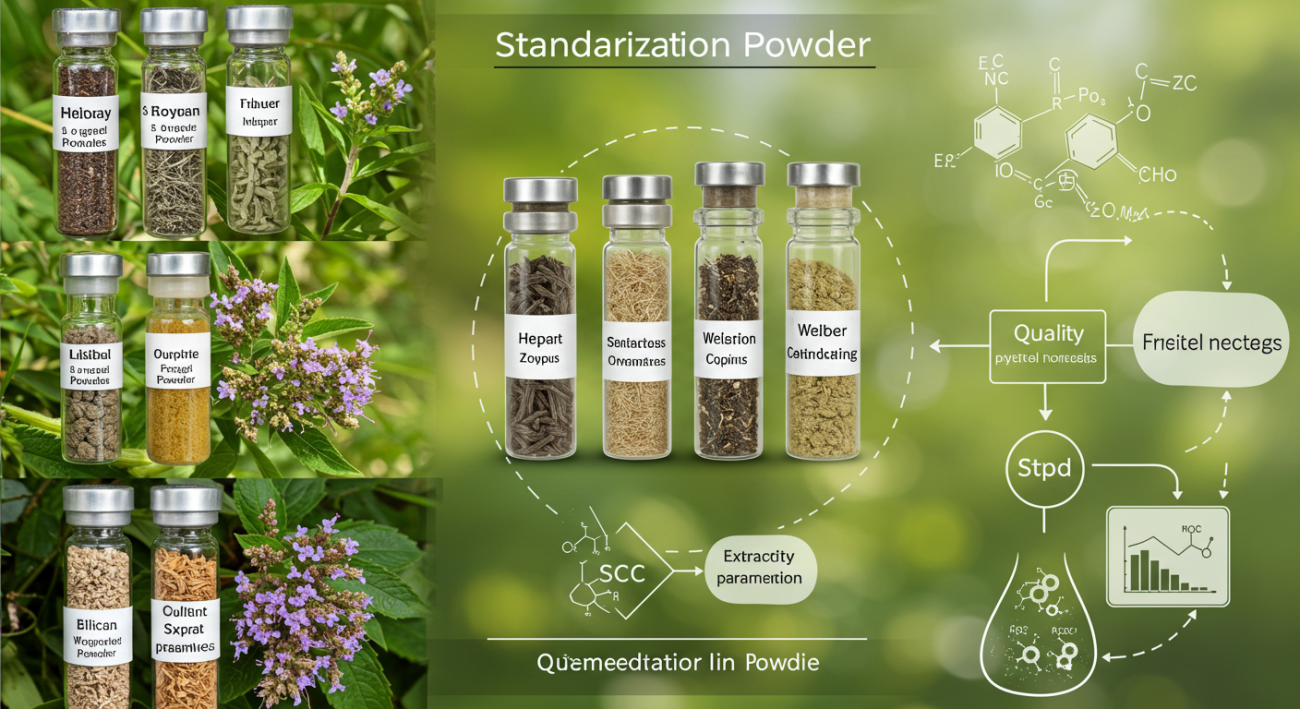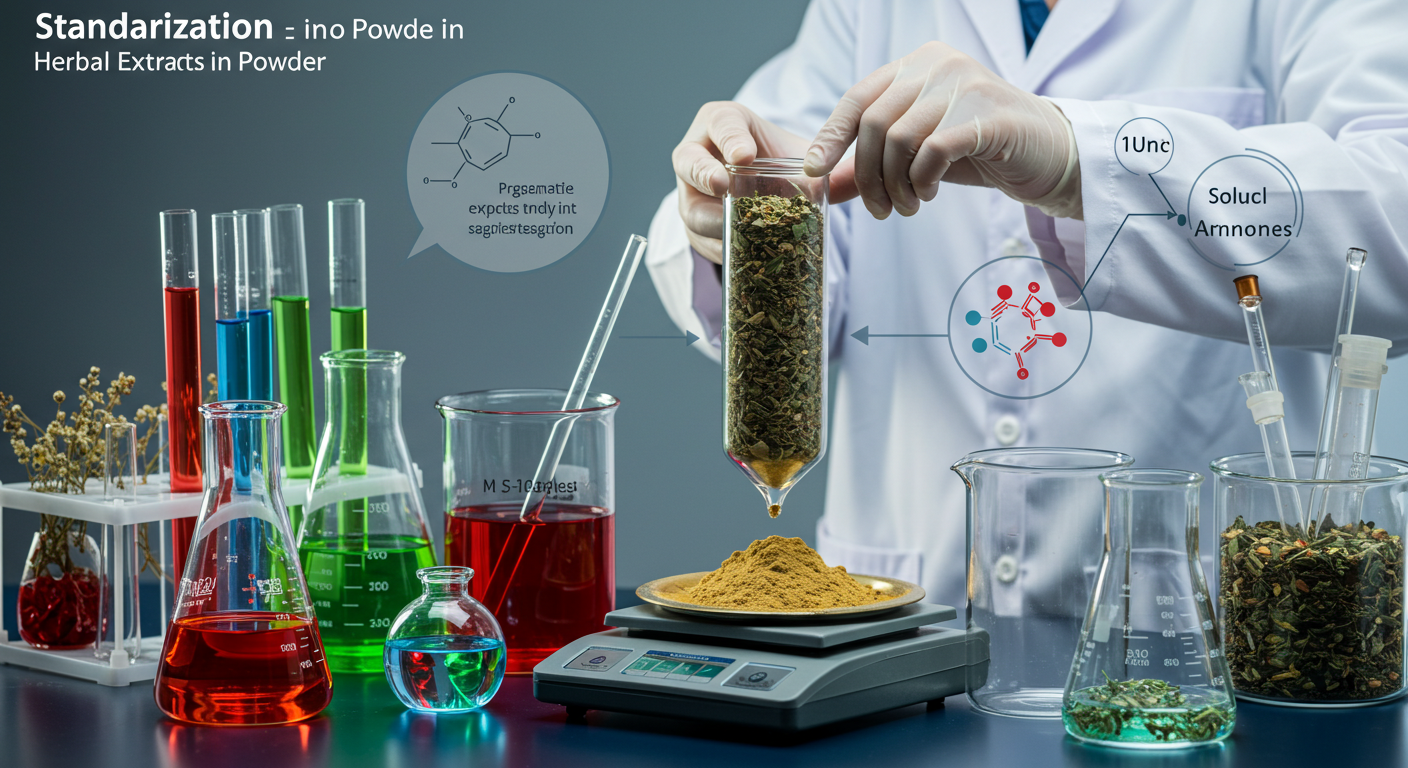Standardization in Herbal Extracts Definition
A standardization formulates and regulates an herbal extract to ensure it contains a specific amount of active principles. Active principles are the herb’s active constituents, which act, like curcumin in turmeric and ginsenosides in ginseng.
For Example:
“Standardized to 95% curcuminoids” means that 95% of the turmeric extract is the active healing compound.
I could, for instance, write a short piece about why herbal extracts need to be standardized and meet the word count you suggested.
Why is Standardization Important in Herbal Extracts?
The trust in herbal medicine has increased from ancient times, but customers desire reliability, safety, and evidence of effectiveness. This is where standardization plays a crucial role as it synonymizes the fusion of modern science with herbal tradition.
What is Standardization?
Standardization is when a modification of an herbal extract is done so that it contains a specific proportion of active constituents whereby phytochemical reproducibility is ensured for every batch.
Significance
The lack of standardization across two batches of the same herbs is problematic. One herb’s batch could be potent, while another is weak. Standardized herbal extracts provide:
• Dosage precision
• Improved therapeutic efficacy
• Better safety profile
• Greater scientific credibility
This is essential for clinical-grade herbal supplements and nutraceutical products.
Reliability Matters
Thriving and BioB companies, for instance, maintain herbaculture reliability by adhering to Good Manufacturing Practices (GMP), issuing Certificates of Analysis (COA), and conducting HPLC Testing. These practices offer cross batch reliability by providing consistency, purity, and potency assurance for all herbal extracts.
The Science Behind Standardization
The following steps outline the standardization of a herb:
1. Determining bioactive compounds such as alkaloids, flavonoids, and saponins.
2. Applying validated methods of extraction like water, ethanol, and CO₂.
3. Ensuring maintenance of consistency across all batches.
4. Quality assessment through HPLC.
5. Confirm repeatability of effects for every administered dose.
This method assures effectiveness for herbal supplements.
Benefits of Standardized Herbal Extracts
Both consumers and manufacturers derive strategic advantages from herbal extracts.
1. Consistency in Potency
Standardized herbal products yield consistency in potency within a calculated range and expected effects proportional to active constituents.
Precision dosage facilitates effectiveness and safety, which is crucial for class medical products.
2. Enhanced Bioavailability
Herbal preparations can be made more effective through specific methods of standardization which increase their absorption and bioavailability.
3. Safety & Purity
Aside from clinical GMP and ISO, standardization also includes COA (Certificate of Analysis). This verifies that the product has been processed adequately and is free from toxic and contaminating substances.
Why the Herbal Industry Adopted Standardization
Spending on herbal supplements is in the billions, and the global market is continuously expanding for nutraceuticals. This is encouraging growth, but at the same time, uniformity in the concentration of phytochemicals is becoming more critical.
Without standardization:
• One batch might be potent
• The next might be too weak
• Or worse, contaminated
Lack of consistency is the reason for trust being lost. With the introduction of standardization, trust is established, compliance to regulations is made easier, customer satisfaction improves, and product versatility is exploited.
Role of HPLC and COA in Standardization
Achieving uniformly standard herbal extracts requires stringent processes such as High-Performance Liquid Chromatography (HPLC). This analytical method separates, identifies, and quantifies active constituents within a heterogeneous extract to attest for its potency, purity, and consistency over different batches or lots.

BioBThriving Puts HPLC at the Forefront of Our Quality Assurance.
Each batch undergoes comprehensive testing to ascertain phytochemical concentration goals are achieved; thus, reliable therapeutic outcomes are assured for manufacturers and formulators.
Practitioners in complementary medicine utilize herbal products due to their effectiveness, simplicity, and cost efficiency. For every purchase, we provide a certificate of analysis form (COA). This document ensures:
• The active ingredient claimed is present and within the specified dosage range.
• Compliance with microbial and pathogen safety standards.
• Absence of pesticides.
• Clearance from heavy metals and other contaminants.
This certification demonstrates to our international clients that the herbal supplements have been tested in laboratories and regionally sourced.
The Role of Standardization in Herbal Medicine
Herbal medicine relies heavily on the method of standardization, which determines the trust placed upon it. Establishing a baseline for quality, safety, and effectiveness relies on pharmaceutical grading. Meeting market expectations and delivering value showcases how standardization fosters reliability. Every extract must pass specific, stringent tested protocols.
Therapeutic Efficacy
Standard extracts enable healthcare practitioners to justifiably charge patients because these extracts allow professionals to deliver:
• Sustaining consistent therapeutic outcomes for patients.
• Delivering precise clinical doses.
• Preventing under- or over administration.
Bioactive compounds that have been quantified with uncertainty allow practitioners complexity-free herbal treatments.
Quality Observed in Pharmaceutical Grades
The adoption of herbal supplements as therapeutic tools and in clinical trials has seen a considerable increase. Regulatory agencies like the FDA and EMA demand specific and reproducible forms of dosage. The lack of standardization of herbal products poses non-compliance with good manufacturing practice (GMP), Certificate of Analysis (COA), or the classification as a serious medicinal product.
Alternative Medicine Practices & Diet
The modern-day consumer pays attention to their health and is very knowledgeable. The consumer looks for the following:
• Label clarity
• Verified warranty of safety
• Measurable outcomes
Herbal standard extracts seek to preserve ancient healing practices alongside modern scientific methods to meet the outlined requirements.
Explore how BioBThriving guarantees clinical-grade standards for botanical extracts and learn what the “g” in “bio g bio” stands for.
What Makes BioBThriving the Perfect Partner for Standardized Herbal Extracts
BioBThriving incorporates ancient knowledge alongside contemporary science to develop herbal extracts that are WIDELY ACCEPTED and needed across industries.
bioBThriving uses advanced pulverizing technology that evacuates during milling to hold evaporative oils and active phytochemicals, which guarantees potency and consistency in every batch. These processes, along with precise phytochemical analysis, enable adhering to start-to-finish manufacturing processes is possible due to bioBThriving’s in-house laboratory.
Developing rare and common flora into pharmaceutical and nutraceuticals is made possible through bioBThriving’s R&D for medicinal plant pharmacology, which enhances extract bioactivity and formulation.
Laboratory-grade authenticity and purity standards are achieved through visual scrutiny and identity chromatographic analysis.
Besides eliminating microbial contaminants, heavy metals, and other extraneous matter, bioBThriving’s patented modern drying techniques also resolve important extraction challenges.
To maintain consistent quality, each herb is carefully pooled from Yunnan and Shaanxi, ensuring that the entire supply chain is verifiable.
• Verified for HPLC phytochemical levels
• Pesticide-free, clean label
• Global shipping & custom formulation available
Conclusion
For businesses operating in the herbal supplement industry, standardization becomes both a brand differentiator and a value proposition. It combines tradition and innovation alongside safety and brand loyalty. For the formulation, the distribution, and even the end user, it offers varying degrees of certainty and predictability for all stakeholders.
Do not risk low quality. BioBThriving certified standard powerful plant extracts.

